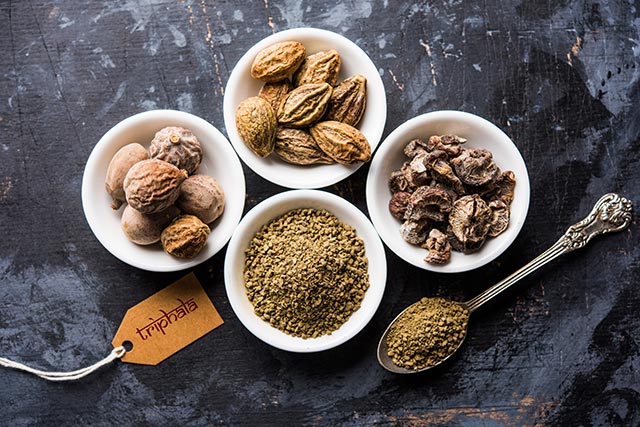Triphala, an ancient remedy for oral and digestive health
10/02/2020 / By Virgilio Marin

Triphala is an herbal preparation that has been traditionally used in Ayurvedic medicine. It’s a powerful remedy used to treat various oral and digestive ailments, such as gingivitis and constipation. Its therapeutic effects stem from its antioxidant, anti-inflammatory and antibacterial properties.
The word “triphala” literally means “three fruits” as the concoction consists of three medicinal fruit plants that are native to India: Indian gooseberry, black myrobalan and belleric myrobalan. For this reason, it is commonly referred to as a polyherbal remedy. Practitioners of Ayurveda believe that triphala confers additional health benefits as its components are said to act synergistically together.
Triphala for oral health
Research shows that rinsing your mouth with a triphala mouthwash can help treat the following oral health problems:
- Gingivitis
- Dental plaque
- Mouth sores
- Fungal infection
Gingivitis is a mild form of gum disease caused by poor oral hygiene. It’s typically associated with the formation of plaque that then leads to the inflammation of the surrounding gum tissue.
One clinical study found that triphala is just as effective as chlorhexidine mouthwash at preventing plaques and gingivitis. The latter is commonly prescribed by doctors to kill oral germs. However, it was deemed unsafe at large doses, having been classified as a poisonous ingredient by the National Library of Medicine.
In the trial, participants were given either triphala, chlorhexidine or plain water mouthwash. After seven days, oral bacteria were reduced by an average of 44 and 45 percent in the triphala and chlorhexidine groups, respectively.
Other studies also suggest that triphala may inhibit fungal growth. According to one study, it may help keep certain Candida species from spreading in the mouth. The authors added that the tannins and plant compounds in triphala have antioxidant properties that may heal mouth sores.
Triphala for digestive health
Research also shows that triphala is beneficial for digestive health.
In a mice study, researchers said that it has a “significant positive effect” on constipation. This is because black and belleric myrobalan – two of triphala’s three components – are both known as potent laxatives. Meanwhile, Indian gooseberry has astringent properties that may help cool the inner lining of the stomach and reduce inflammation.
In addition, triphala may be beneficial if you have irritable bowel syndrome (IBS) particularly if the main symptom is constipation. Research also shows that taking triphala with or without probiotics can augment IBS treatment.
Moreover, it may help balance the amount of beneficial and harmful gut bacteria, which is important for overall gut health. In fact, a study involving fruit flies found that combining triphala with probiotics may not only enhance gut microbial composition – it may also improve how food is metabolized by the body. (Related: Behind the scenes: Chebulinic acid, an active ingredient of popular Ayurvedic medicine triphala, has anti-tumor properties.)
Triphala comes in the form of capsules, tablets and powders. Which one of these is appropriate depends on what you’re treating. If you need to use it as a mouthwash, powdered triphala is usually recommended. Simply mix two to three spoonfuls with one quart of water and bring the mixture to a simmer.
If you’re using it to improve digestion, capsules and tablets are ideal. There’s no established dosage of triphala for internal use, though in many supplements, each ingredient is about 300 milligrams (mg) per dose. That means one dose can be around 900 to 1,000 mg of triphala.
However, it’s best to consult a medical professional first before taking any herbal supplements.
Learn more about the benefits of triphala at Remedies.news.
Sources include:
Submit a correction >>
Tagged Under:
alternative medicine, antibacterial, Ayurvedic medicine, constipation, dental plaque, digestion, disease treatments, food cures, food is medicine, functional food, gingivitis, herbal medicine, herbal remedies, Herbs, irritable bowel syndrome, natural cures, natural medicine, oral health, polyherbal remedy, prevention, remedies, supplements, Triphala
This article may contain statements that reflect the opinion of the author
RECENT NEWS & ARTICLES
COPYRIGHT © 2017 NATURAL CURES NEWS





















